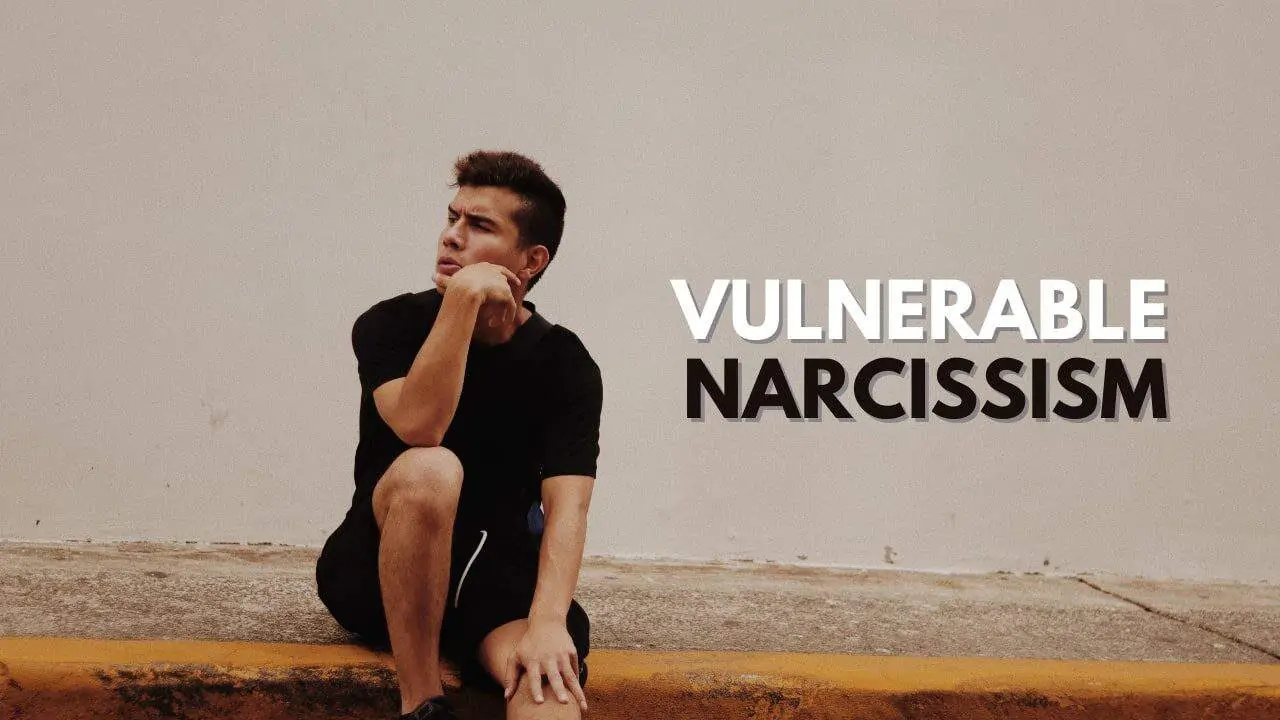Today's Monday • 10 mins read
The vulnerable narcissist has a fragile ego, clings to their negative past, and is readily offended by criticism or negative comments. Find out more about them.
Narcissists have an inflated self-image, lack empathy, and constantly need praise. They feel entitled and exploit others for their own benefit.
However, not all narcissists may agree with the below:
- “My feelings are easily hurt by ridicule or the slighting remarks of others.”
- “When I enter a room I often become self-conscious and feel that the eyes of others are upon me.”
Those who agree strongly with those two statements from the Hypersensitive Narcissism Scale (HSNS) by Hendin and Cheek (1997) are most likely vulnerable narcissists.
The idea to divide narcissism into two types, Grandiose and Vulnerable, came from Paul Wink from UC Berkeley, in 1991. The grandiose narcissists are the arrogant and self-confident ones who flaunt their superiority.
But how is the vulnerable narcissist different from other types of narcissism?

Vulnerable Narcissist: The Fragile & Not-So-Dark Narcissist
Vulnerable narcissism is a personality trait characterized by feelings of inferiority, insecurity, and sensitivity to criticism. People with vulnerable narcissism often have a fragile sense of self-worth, and may be easily wounded by the opinions of others. They may also have a strong need for attention and praise, and may become angry or defensive when they do not receive it.
They are also known as covert narcissists (hidden narcissists), While they may outwardly be self-effacing, with fragile egos and low self-confidence, they do have a grandiose self-image.
The concept of vulnerable narcissism was first introduced by Wink (1991), who found that two dimensions of narcissism could be identified: grandiose and vulnerable. Grandiose ones are extroverted and have a high sense of self-importance. Vulnerable ones have feelings of inferiority, insecurity, and sensitivity to criticism.
They are often defensive, avoidant, insecure, and hypersensitive persons who are hypervigilant to criticism (Wink, 1991; Miller, 2011).
They often have vague feelings of depression, anxiety, and insecurity, and lack the motivation to work (narcissistic deficiency).
However, they do have the classic narcissistic traits of grandiose fantasies, a tendency to exploit others when they find the chance, and a sense of entitlement (though hidden).
Here are some of their main features:
- Vulnerable narcissists need admiration to boost self-worth (Pincus et al., 2009; Miller et al., 2011).
- They may experience withdrawal and passive behavior when feeling underestimated (Pincus et al., 2009; Miller et al., 2011).
- Vulnerable narcissism is associated with lower self-esteem, extraversion, agreeableness, and higher neuroticism as compared to grandiose ones (Miller et al., 2011, 2018; Maciantowicz & Zajenkowski, 2018).
- Vulnerable narcissists often have a negative view of the past and a fatalistic attitude (Zajenkowski et al., 2016).
Vulnerable narcissism is defined as “the narcissistic personality style in which one feels hopelessly inadequate, yet paradoxically grandiose and entitled at the same time.”
The most common personality trait associated with vulnerable narcissism is neuroticism, which is followed by low agreeableness and low extraversion (Miller, et al., 2018).
Vulnerable narcissists have low, fragile, and highly dependent self-esteem (Rogoza et al., 2018).
Here Below is the clip of Scott Barry Kaufman on Dr. Phil talking about vulnerable narcissism and its implications for self-actualization and society.
Vulnerable narcissists may also exhibit hostile attitudes (Czarna et al., 2019), frequently accompanied by rumination of anger (Krizan & Johar, 2015).
In a 2021 metastudy, researchers Zajenkowski, Rogoza, and others found vulnerable narcissism more strongly predicted antagonism.
They say the study seems to suggest,
“Antagonism is more characteristic of vulnerable narcissists, especially low empathy and concern for others, as indicated by their lower levels of the compassion facet.” — Zajenkowski & Rogoza
Some experts argue that all narcissism is grandiose and all narcissists lack empathy for others.
However, studies show that higher emotional intelligence (EI) is positively linked to empathy (Ciarrochi et al., 2000), and more empathic people tend to have lower levels of vulnerable narcissism (Lannin et al., 2014).
Moreover, Lopes et al. (2005) found that those who can regulate their emotions better, which is an aspect of EI, tend to show more prosocial tendencies. That is, they are more inclined to help others and behave in socially responsible ways.
But these prosocial tendencies are not common among people with high levels of vulnerable narcissism (Miller et al., 2011).
Moreover, certain characteristics of vulnerable narcissism (such as emotional instability, self-centeredness, and difficulties in maintaining relationships and understanding others’ viewpoints) are typically associated with low emotional intelligence (Mayer et al., 2004).
How To Spot A Vulnerable Narcissist
People who score high on vulnerable narcissism are self-centered, but unlike grandiose narcissists, suffer from depression and low self-esteem, and are more negatively biased.
Hendin and Cheek (1997) developed the Hypersensitive Narcissism Scale (HSNS) to measure vulnerable narcissism. The HSNS is a 16-item self-report scale that asks participants to rate how well they agree with statements such as “I am easily hurt by others’ remarks” and “I am very sensitive to criticism.”
Individuals who score high on the HSNS tend to have neuroticism, disagreeableness, and introversion. They are also more likely to experience anxiety, depression, and low self-esteem.
Some typical characteristics of vulnerable narcissists are:
1. Fragile Ego and Low Self-Esteem
Vulnerable narcissists have low self-esteem.
However, vulnerable narcissism is not the same as low self-esteem. People with low self-esteem simply have a negative view of themselves. People with vulnerable narcissism, on the other hand, have a fragile sense of self-worth that is easily threatened by the opinions of others.
The vulnerable narcissist lacks the brashness and egocentrism of the grandiose narcissist. Their fragile egos often crumble in the face of humiliation and criticism.
Even mild criticism, constructive feedback, or public scolding may cause them to withdraw into their shells or disappear from their social circles.
2. Negative Outlook and Overthinking
They ruminate or overthink more, have a more negative view of past events, and recall more adverse childhood memories.
This constant overthinking can lead to a pervasive sense of pessimism and self-doubt, which can further impact their self-esteem and emotional stability.
As a result, vulnerable narcissists may struggle to find happiness or contentment in their daily lives, often feeling trapped by their negative thoughts and memories.
3. Introversion and Sensitivity
They are more introverted, touchy, and easily hurt (thus the term “vulnerable”).
This introverted nature often causes them to be more reserved in social situations and less likely to seek attention or admiration from others.
Their sensitivity causes them to react more strongly to negative comments or acts, making it difficult for them to maintain healthy relationships with others.
4. Difficulty Coping with Emotional Pain
Vulnerable narcissists struggle to cope with setbacks, rejection, and emotional pain.
This inability to manage emotional distress can lead them to dwell on negative experiences and prevent them from moving forward or finding healing.
Because they often cling to the negatives from their past, they develop unhealthy coping mechanisms or avoidance strategies that further worsen their emotional struggles.
5. Anxiety and Intrusive Thoughts
Vulnerable narcissists are highly anxious people who keep having intrusive thoughts. They worry too much about the impressions they make on others.
This constant state of anxiety can affect their daily functioning and relationships, as they may become preoccupied with how they are perceived by those around them.
Their excessive concern over their image may lead to social avoidance, further isolating them from potential support and healthy interactions.
6. Sensitivity to Criticism and Need for Admiration
Vulnerable narcissists are overly sensitive to perceived criticism while harboring a deep narcissistic need to be admired.
This mix of emotional fragility and desire for validation makes them seek reassurance and praise from many people, some of whom may give them unfavorable feedback.
When faced with negative feedback, they may react defensively or even aggressively.
Together, these factors further complicate their relationships and block their ability to grow and learn from constructive criticism.
Narcissists are experts at turning the argument and making you feel like you are the one who is wrong. Find out how to correctly argue with a narcissist.
7. Prone to Depression and Self-harm
They are prone to depression and self-harming acts.
They withdraw into themselves to escape feelings of shame, pain, envy, or being labeled as “fragile” (Kealy & Rasmussen, 2011).
It exposes the vulnerable narcissist to depression and anxiety, and may increase the number of attempted suicides (Dawood et al., 2018, Ronningstam and Maltsbreger, 2010).
Vulnerable narcissism is not the same as positive narcissism. A positive narcissist has healthy levels of self-confidence, self-love, and self-interest, whereas a vulnerable narcissist harbors insecurity, dependence on others for validation, and fear of abandonment.
The basic goal of a narcissist is to maintain their self-esteem.
— Morf & Rhodewalt, 2001
Vulnerable Narcissist vs Grandiose Narcissist
Both types of narcissists share some common traits.
- both types have an exaggerated sense of self-worth,
- both lack empathy and compassion for others,
- both need constant admiration from others, and
- both harbor a sense of entitlement.
The major difference between these two types:
- Vulnerable narcissists have a greater fear of being alone (autophobia), while
- Grandiose narcissists have a greater need for admiration from others.
- Vulnerable narcissists, on the other hand, defend their self-esteem by withdrawing to avoid feelings of shame, pain, or envy (Caligor, Levy, & Yeomans, 2015), while allowing themselves to fantasize about being superior to others.
- Grandiose narcissists try to preserve their self-esteem by vigorously promoting themselves, seeking praise, and insulting others.
- Vulnerable or sensitive narcissists retreat into their shells to protect against further damage to their self-esteem. They are insecure and always looking for dangers to their self-esteem.
- Grandiose narcissists tend to repair their self-esteem by asking others to validate them. They are confident in maintaining their self-esteem.
- Vulnerable narcissism is marked by more internalizing symptoms and emotional distress, whereas
- Grandiose narcissism is marked by more externalizing actions, particularly anger and aggression in response to perceived slights or ego threats (Bushman & Baumeister, 1998).
- Vulnerable narcissism has high Neuroticism and low Agreeableness (Campbell & Miller, 2013), as described from a basic personality-trait standpoint, and
- Grandiose narcissism is best described as having low Agreeableness and high Extraversion (O’Boyle, Forsyth, Banks, Story, & White, 2015;)
Surprisingly, in previous editions of the Diagnostic and Statistical Manual of Mental Disorders, vulnerable narcissism was seemingly downplayed in NPD (DSM; APA, 1980, 1994, 2013).
Causes of Vulnerable Narcissism
Vulnerable narcissists may have had difficult childhoods and abusive or neglectful parents or guardians.
As a result, their characteristic behaviors developed as a defensive mechanism to safeguard their fragile self-esteem or confidence during their formative years.
The root cause of their vulnerability is most likely a deep sense of insecurity about being unworthy and ‘not good enough.’
Although some psychologists believe that this disorder may also be caused by overindulgence by parents or other parental figures.
Final Words
The word “narcissism” comes from the Greek myth of Narcissus, who was so infatuated with his own reflection in the water that he did not notice the people around him until he eventually died of starvation.
This term was first used by Freud to describe a personality disorder involving excessive self-love. Freud had an early understanding of how narcissism could manifest itself in people.
If we look around, we’d find many vulnerable narcissists around us. In fact, we, ourselves, might be the ones doing some weird covert narcissist things.
It’s time we accepted them as a functional part of our society, and not separate from the classic narcissists.
• • •
• • •
Author Bio: Researched and reviewed by Dr. Sandip Roy. His expertise is in mental well-being, positive psychology, narcissism, and Stoic philosophy.
√ If you liked it, please spread the word.
